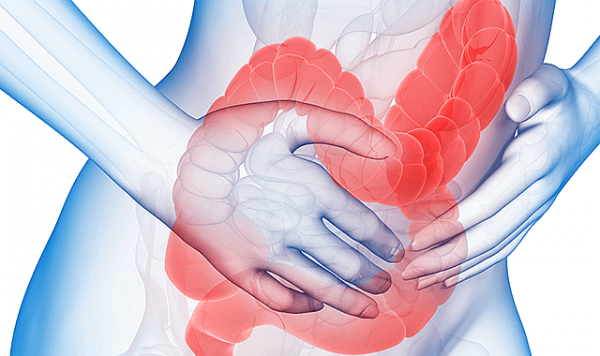The Relationship Between Stress and Irritable Bowel Syndrome


Written and verified by the psychologist Valeria Sabater
Increasing numbers of tests and clinical studies are now showing a relationship between stress and irritable bowel syndrome (IBS). This gastrointestinal condition affects nearly 10% of the population, many of them women. Psychological strategies for emotional management can really improve the quality of life for people with IBS.
We still don’t understand exactly how stress can so significantly affect our gut health. However, studies like the one from New York State University in Albany reveal something quite interesting.
More than 60% of people who have anxiety disorders also have irritable bowel syndrome. Scientists believe that this condition is another example of the complex biological relationship between the brain and the gut.
According to the Spanish Association of Gastroenterology, irritable bowel syndrome is the most common functional digestive disorder seen in clinic.
This illness is also the most common digestive problem. So many patients bounce from specialist to specialist and still can’t find an effective solution. Therefore, it is especially important to consider the psychological factor. A new perspective, along with diet and medications, could hopefully help create an effective treatment plan.

The relationship between stress and irritable bowel syndrome
Now the medical community is more accepting of the relationship between stress and irritable bowel syndrome. There are some who think that psychological factors intensify the disorder, but that they aren’t a contributing cause. In that case, stress would abnormally increase the movement and contractions of the gastrointestinal tract.
Other specialists believe in the theory that our emotional and psychological problems alter our immune system. Our body’s natural immunity changes so much that it provokes an inflammatory response in the intestinal mucous membrane. The changes would manifest in the symptoms that make up irritable bowel syndrome. Let’s see what the most common clinical presentation of IBS is:
- Sharp, painful cramping in the abdomen. This pain might be moderate to mild and last a few hours.
- The patient has some periods of constipation and others of diarrhea.
- Constant gas.
- Quickly feeling full. The patient feels full after eating just a little bit.
- Nausea, vomiting, and a burning sensation in the chest.

What helps for irritable bowel syndrome?
We know that there is a clear relationship between stress and irritable bowel syndrome. Now, we don’t have enough evidence to know whether stress causes IBS or just intensifies it. However, there are certain factors that have been proven to be related.
Genetics play a role in the prevalence of the syndrome. In other words, if your mother suffers from irritable bowel syndrome and you are a woman, the probability that you will have IBS increases.
We also know that following a specific diet can improve IBS. So, if you follow your doctor’s guidelines and keep your stress at bay, your quality of life will improve. Also, don’t forget that irritable bowel syndrome can really limit a person’s life. They have to miss out on social activities, and sometimes even work. It is a silent pain that deserves greater visibility and sensitivity.

Guidelines for improving irritable bowel syndrome
It is important to be aware that your gut acts like an emotional barometer. Everything that worries the brain also has an impact on your intestinal membrane. Stress and anxiety affect gut inflammation, motility, and overall health.
- So, it’s a very good idea to try to manage your stress better. Clarify your priorities. Remember what your needs are. Give yourself time, and use proper breathing and relaxation techniques.
- Physical exercise is another factor that will notably improve your gut health. In light of this clear relationship between stress and irritable bowel syndrome, you should always keep in mind the importance of exercise. Something as simple as going on a walk can help in a big way.
- Eating a diet low in FODMAPs (simple sugars, dairy, and wheat).
- Reduce your consumption of fat, caffeine, and processed food.
- Stay hydrated.
- Eat slowly. Small meals five times a day are preferable.
- Eat probiotic and prebiotic foods.
Considering the fact that increasing numbers of people are suffering from irritable bowel syndrome, this information is important. Before turning to medication, it is always best to try to foster healthy habits. Managing your stress, taking time to rest, following a healthy diet, and practicing relaxation techniques can help you feel better every day.
Increasing numbers of tests and clinical studies are now showing a relationship between stress and irritable bowel syndrome (IBS). This gastrointestinal condition affects nearly 10% of the population, many of them women. Psychological strategies for emotional management can really improve the quality of life for people with IBS.
We still don’t understand exactly how stress can so significantly affect our gut health. However, studies like the one from New York State University in Albany reveal something quite interesting.
More than 60% of people who have anxiety disorders also have irritable bowel syndrome. Scientists believe that this condition is another example of the complex biological relationship between the brain and the gut.
According to the Spanish Association of Gastroenterology, irritable bowel syndrome is the most common functional digestive disorder seen in clinic.
This illness is also the most common digestive problem. So many patients bounce from specialist to specialist and still can’t find an effective solution. Therefore, it is especially important to consider the psychological factor. A new perspective, along with diet and medications, could hopefully help create an effective treatment plan.

The relationship between stress and irritable bowel syndrome
Now the medical community is more accepting of the relationship between stress and irritable bowel syndrome. There are some who think that psychological factors intensify the disorder, but that they aren’t a contributing cause. In that case, stress would abnormally increase the movement and contractions of the gastrointestinal tract.
Other specialists believe in the theory that our emotional and psychological problems alter our immune system. Our body’s natural immunity changes so much that it provokes an inflammatory response in the intestinal mucous membrane. The changes would manifest in the symptoms that make up irritable bowel syndrome. Let’s see what the most common clinical presentation of IBS is:
- Sharp, painful cramping in the abdomen. This pain might be moderate to mild and last a few hours.
- The patient has some periods of constipation and others of diarrhea.
- Constant gas.
- Quickly feeling full. The patient feels full after eating just a little bit.
- Nausea, vomiting, and a burning sensation in the chest.

What helps for irritable bowel syndrome?
We know that there is a clear relationship between stress and irritable bowel syndrome. Now, we don’t have enough evidence to know whether stress causes IBS or just intensifies it. However, there are certain factors that have been proven to be related.
Genetics play a role in the prevalence of the syndrome. In other words, if your mother suffers from irritable bowel syndrome and you are a woman, the probability that you will have IBS increases.
We also know that following a specific diet can improve IBS. So, if you follow your doctor’s guidelines and keep your stress at bay, your quality of life will improve. Also, don’t forget that irritable bowel syndrome can really limit a person’s life. They have to miss out on social activities, and sometimes even work. It is a silent pain that deserves greater visibility and sensitivity.

Guidelines for improving irritable bowel syndrome
It is important to be aware that your gut acts like an emotional barometer. Everything that worries the brain also has an impact on your intestinal membrane. Stress and anxiety affect gut inflammation, motility, and overall health.
- So, it’s a very good idea to try to manage your stress better. Clarify your priorities. Remember what your needs are. Give yourself time, and use proper breathing and relaxation techniques.
- Physical exercise is another factor that will notably improve your gut health. In light of this clear relationship between stress and irritable bowel syndrome, you should always keep in mind the importance of exercise. Something as simple as going on a walk can help in a big way.
- Eating a diet low in FODMAPs (simple sugars, dairy, and wheat).
- Reduce your consumption of fat, caffeine, and processed food.
- Stay hydrated.
- Eat slowly. Small meals five times a day are preferable.
- Eat probiotic and prebiotic foods.
Considering the fact that increasing numbers of people are suffering from irritable bowel syndrome, this information is important. Before turning to medication, it is always best to try to foster healthy habits. Managing your stress, taking time to rest, following a healthy diet, and practicing relaxation techniques can help you feel better every day.
This text is provided for informational purposes only and does not replace consultation with a professional. If in doubt, consult your specialist.







